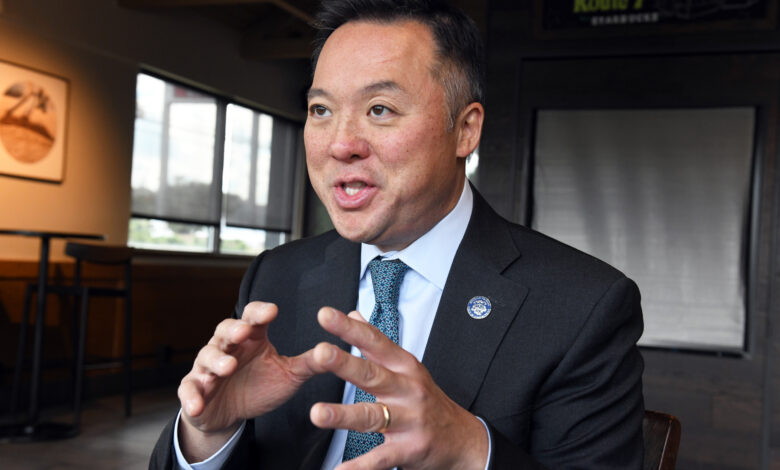Why Asian Americans’ impact is growing in CT politics

During his first run for state attorney general, William Tong spoke with several hundred delegates ahead of the Connecticut Democratic Party’s convention in the spring of 2018, as he sought the party’s endorsement for the nomination.
When Tong called one of the delegates, a woman who was an attorney, she praised him for his record. At that point, he was an experienced attorney who had served for 11 years as a state representative for the 147th District, which includes parts of Stamford and Darien. His leadership roles included serving as the House chairman of the state General Assembly’s judiciary committee.
But when Tong asked if she would support his candidacy, she replied, “you just don’t look like what I think an attorney general should look like.”
Tong was shocked by the response, which he interpreted as the delegate’s refusal to even consider supporting him because he is Asian American. But he was undeterred. At the convention, he secured the endorsement for the nomination and then prevailed in the Democratic primary. In November 2018, he won the general election, with about 53 percent of the vote. Last month, he was re-elected for a second term, with approximately 57 percent of the vote.
In Connecticut, Tong, 49, is the first Asian American elected to a seat in the General Assembly and the first elected and re-elected to a statewide position — breakthroughs that have been accompanied by the election of several other Asian American candidates to seats in the state legislature in the past decade and a half.
Despite those milestones, significant challenges remain. Asian Americans are still underrepresented in elected positions in Connecticut, and events during the COVID-19 pandemic have highlighted the persistent hate and discrimination that the community faces. But Asian Americans’ electoral wins, legislative accomplishments and growing presence in the state highlight their increasing impact as voters and political leaders.
“I’m not going anywhere, and people like me aren’t going anywhere,” Tong said in an interview. “And you can’t wish us away and deny that the world is changing.”
Electoral breakthroughs
Asian Americans have lived in Connecticut since at least the 19th century. But not one would be elected to a state-level position until Tong’s election to the state House of Representatives in 2006.
At the time of his 2006 victory, Tong was a 33-year-old litigator working in Stamford. He was born in Hartford and grew up in Glastonbury and West Hartford. His mother and father, who, respectively, emigrated from Taiwan and China, owned and operated Chinese restaurants in Wethersfield, Hartford and Canton for many years.
“I’m incredibly fortunate,” Tong said. “My parents worked extraordinarily hard, so that in one generation I could go from a Chinese restaurant to the attorney general of our state.”
Tong broke the state-level electoral barrier for Asian Americans amid significant demographic shifts. From 2000 to 2019, Asian Americans were the fastest-growing racial or ethnic minority group in Connecticut and the entire U.S., according to Pew Research Center. During that period, Connecticut’s Asian American population grew from about 85,000 to around 172,000. The group’s growth accounted for 57 percent of the state’s total population increase in that span, according to Pew Research Center. As of last year, Asian Americans comprised about 5 percent of Connecticut’s population of approximately 3.6 million, according to the U.S. Census Bureau.
Immigration from Asian countries has driven the growth. Since 2009, more Asian immigrants than Hispanic immigrants have arrived in the U.S., and Asians are projected to be the largest immigrant group in the U.S. by 2055, according to Pew Research Center.
“It speaks volumes about what Connecticut has become,” Gary Rose, chairman of the government department at Sacred Heart University, said in an interview. “It used to be pretty stodgy. The demographics of Connecticut have changed. I think William Tong’s election was just the beginning of more diversity in higher office here in Connecticut.”
In 2008, Tony Hwang became the second Asian American elected to the state House of Representatives and first from the Republican Party. That year, he won the race to represent the 134th District, which includes parts of Fairfield and Trumbull.
Hwang is the first Asian American state legislator in Connecticut born outside the U.S. In the early 1970s, when he was nine years old, he immigrated with his family to the U.S., from Taiwan. His parents had fled to Taiwan from China in the wake of the 1949 Chinese Revolution, through which the Chinese Communist Party took power.
In 2014, Hwang became the first Asian American elected to the state Senate, when he won the race to represent the 28th District, which includes Easton, Fairfield and Newtown, as well as parts of Weston and Westport. Last month, he was re-elected for a fifth term.
His professional experience also includes working as a Realtor, although he said he took a sabbatical from real estate to focus on his work in the state Senate.
“It is a great source of pride to be a state senator who understands the language, culture and various experiences of Asian-Pacific Americans,” Hwang said in an interview.
During the past 20 years, Asian Americans have broken a number of electoral barriers in Connecticut and nationwide.
2006: William Tong is elected to the state House of Representatives. The Democrat is the first Asian American, from any party, elected to a state-level position in Connecticut
2008: Tony Hwang is elected to the state House. He is the first Asian American Republican elected at the state level in Connecticut
2014: Hwang is elected to the state Senate, the first Asian American elected to the upper chamber of the General Assembly
2018: Tong is elected state attorney general, the first Asian American elected to a statewide position in Connecticut
2018: Democrat Raghib Allie-Brennan is elected to the state House, and Democrat Saud Anwar is elected to the state Senate. Anwar is the first Asian American Democrat elected to the state Senate
2020: Republicans Harry Arora and Kimberly Fiorello are elected to the state House
2020: Sen. Kamala Harris, D-California, is elected vice president. She is the first Asian American — as well as the first Black American and first woman — to serve as vice president
2022: Tong is re-elected attorney general, the first Asian American re-elected to a statewide position in Connecticut
2022: Democrat Maryam Khan is elected to the state House, and Democrat MD Rahman is elected to the state Senate
Source: Public electoral records, elected officials’ websites, various news reports
The election of Tong and Hwang was an important source of encouragement for other Asian Americans who have been elected in the past few years.
State Sen. Saud Anwar, who immigrated to the U.S., from Pakistan, at age 24 in the early 1990s, is the first Asian American Democrat elected to the state Senate. Last month, he was re-elected for a third term to represent the 3rd District, which includes East Hartford, East Windsor and South Windsor, as well as part of Ellington. Also a doctor trained in pulmonology and critical-care medicine, he formerly served as mayor of South Windsor.
“Representation matters,” Anwar said in an interview. “When you take the oath, you’re taking the oath to take care of each and every person in your community. But we also know that individuals of certain backgrounds can inspire individuals of the same background.”
In 2020, state Reps. Raghib Allie-Brennan and Harry Arora were among a record number of Indian Americans elected to state houses that year, according to South Asia Monitor. Allie-Brennan, a Democrat who was first elected in 2018, represents the 2nd District, which includes parts of Bethel, Danbury, Newtown and Redding. Arora, a Republican who emigrated from India, has represented the 151st District, which includes part of Greenwich, since he was first elected in a special election in January 2020.
This year, Arora won his party’s nomination for state treasurer, but he lost in the general election. As a result of his run for treasurer, he did not run for another term as a state representative.
While the first Asian Americans elected to the General Assembly were all men, some women have been elected as well during the past couple of years. Republican state Rep. Kimberly Fiorello, who was born in South Korea, was elected in 2020 in the 149th District, which includes parts of Greenwich and Stamford. She will not return for a second term, after an unsuccessful run for re-election this year.
Democratic state Rep. Maryam Khan, who emigrated from Pakistan, will serve her first full term after winning last month. She has held the seat for the 5th District, which includes parts of Hartford and Windsor, since winning a special election last March. She is the first Muslim member of the state House.
Fellow Democrat and state Sen.-elect MD Rahman, who emigrated from Bangladesh, was also elected last month for a first term. He will represent the 4th District, which includes Andover, Bolton, Glastonbury and Manchester.
Despite the electoral victories of recent years, Asian Americans are still underrepresented in the General Assembly, with about a half-dozen Asian American legislators set to serve in the legislature for the next two-year term. Since Asian Americans comprise about 5 percent of Connecticut’s population, proportional representation would entail there being about 10 legislators from the group among the 151 representatives and 36 senators in the legislature.
There are also few Asian Americans holding local elected positions. Bloomfield Mayor Danielle Wong, who is Black and Asian American, is the only Asian American and one of only three incumbents of color among the mayors and first selectpersons of Connecticut’s 169 cities and towns, according to an analysis by Hearst Connecticut Media Group.
“Connecticut is supposed to be this progressive state, and we are pretty trending as it relates to policy, but it’s not reflected in our leadership,” Wong, a Democrat, said earlier this month.
In Hamden, Yale University student Mariam Khan was elected last year, then aged 19, to the town’s Board of Education. Khan, a Democrat, is the first Asian American, first Muslim and youngest-ever person to serve on the board.
“Being a Muslim woman, being a young woman, being the daughter of immigrants, there are a lot of perspectives that are new and novel and just represent and reflect the community of Hamden,” Khan, whose parents emigrated from Pakistan, said in an interview. “At the same time, we can’t get too hung up on the ‘firsts’ because we need to be complementing that with true accountability and having a vision.”
Challenges during a pandemic
In early 2020, the first stages of the COVID-19 pandemic unleashed a new wave of hate and discrimination against Asian Americans, who were scapegoated for the virus’ spread from China. The hostility was inflamed by some public figures, such as then-President Donald Trump.
Cognizant of that hostility, Tong was anxious when he became sick in March 2020 — not just about the seriousness of the illness, but also about how the public would respond if it turned out to be COVID-19.
“The pandemic, hate and racism, the ‘China virus’ and Donald Trump all came together in this really terrible moment, where not only was I really sick, but if people learned that the Chinese-American attorney general had gotten really sick, then people would blame me,” Tong said. “Thankfully, I went to the emergency room, got tested, and I had the flu.”
In November 2020, Trump lost to Joe Biden in the presidential election. Among validated voters, 72 percent of Asian Americans chose Biden, while 28 percent picked Trump, according to a Pew Research Center analysis.
At the same time, Kamala Harris, a senator from California and previously the state’s attorney general, was the first Asian American, first Black American and first woman to be elected vice president.
“It restores, frankly, my hope and confidence in our future,” Tong said in a Nov. 8, 2020 interview, after posting on Twitter a photo of Harris and him laughing at a 2019 fundraiser in Greenwich when she was running for president. “For AAPIs (Asian Americans and Pacific Islanders) broadly — but, in particular, for me and other Chinese- Americans — this has been a really rough year because the president has blamed us for the virus.”
Such criticism has not chastened Trump. In a Sept. 30 post on the social media platform Truth Social, he attacked Senate Minority Leader Mitch McConnell and his wife, Elaine Chao, who served as transportation secretary in Trump’s administration and as labor secretary in George W. Bush’s administration.
Hwang condemned that outburst.
“The ‘death wish’ comment about Senator McConnell is outrageous and dangerous, especially in light of increasing violence in our society and threats against public service officials,” Hwang said in an Oct. 3 statement. “The demeaning comments against former secretary of labor and transportation Chao, an outstanding public servant and philanthropist, were hurtful and equally dangerous. As an Asian American who is proud and grateful to be an American in public service, I was personally offended.”
Making an impact
The growing representation of Asian Americans in electoral politics is significant, but by itself it will not bring about necessary changes, according to advocates for the Asian American community.
“Anti-AAPI hate is a systemic problem that requires systemic solutions — and that means robust policy change,” the Stop AAPI Hate coalition said in a written response to an inquiry. “We need policymakers to take action to protect our civil rights, educate our children and ensure the safety and well-being of AAPI communities.”
Heeding that call, Asian American legislators in Connecticut have played a leading role in efforts to support Asian Americans and other under-represented groups. In this year’s session of the General Assembly, legislators passed legislation requiring Asian American and Pacific Islander studies to be included in Connecticut public schools’ secondary-level social studies curricula. Connecticut is one of the first states to mandate that schools offer AAPI studies, a requirement that goes into effect in the fall of 2025.
“Being able to understand diversity and how this country was built, we move away from the stereotyping and mythmaking to really looking at individuals as unique in their contributions, and not by racial labeling,” said Hwang, one of the sponsors of the AAPI studies legislation.
Among other notable measures aimed at helping groups including Asian Americans, the state legislature passed legislation this year that stipulates the establishment of a hate crimes investigative unit within the State Police. It also passed legislation that supported the launch last year of the state’s Hate Crimes Advisory Council.
“This is going to be pretty comprehensive in looking at hate crimes, whether they’re against the AAPI community or against other minorities,” said Anwar, one of the sponsors of the bill establishing the hate crimes investigative unit. “We wanted to have a better understanding and equip our police to prevent such things from happening.”
Among Khan’s contributions during her first year as a Hamden school board member, the board decided last February to add the Muslim holiday of Eid al-Fitr, which is celebrated at the end of Ramadan, to the school district’s calendar. The change goes into effect this school year, so Muslim students — many of whom are Asian American — and the rest of their classmates will have a day off on April 21 for the next Eid al-Fitr. That day will coincide with the school district’s 2023 spring recess.
“Nothing can replace lived experience,” said Khan, a biology major who aspires to pursue a career in the medical field. “It starts with interpersonal relationships, conversations and things that people think are small to make the big policy changes and the big sweeping wins.”
Elected officials’ constituent services are also crucial for the Asian American community. Tong cited the work by him, when he was a state representative, and other elected officials to help secure a stay of deportation in 2018 for Farmington residents Zhe Long “Tony” Huang and Xiang Jin “Kris” Li. As the owners of a nail salon in Simsbury and the parents of two sons born in the U.S., the couple had faced deportation to China.
“If life had been just a little different, if my life had taken a turn one degree to the left or right, if my dad or mom hadn’t caught this break or that break, we could be just like the Huangs,” Tong said. “It is so important that people like the Huangs, people with their experience, have somebody to fight for them. And because I share some of their experience, I’m going to fight for them.”
pschott@stamfordadvocate.com; twitter: @paulschott



















